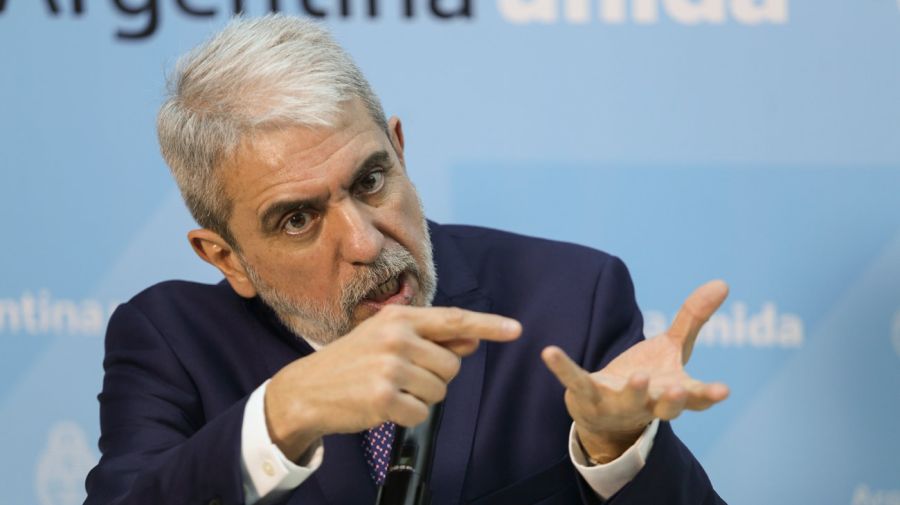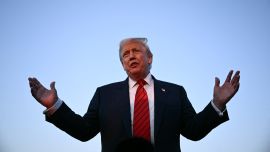Security Minister Aníbal Fernández, who has won the confidence of both Alberto Fernández and Cristina Fernández de Krichner in his lengthy political career occupying posts of key importance in different Peronist governments, gave an interview both before and after the president ended his re-election bid.
The 66-year-old government official stakes his bets on the unity of the Frente de Todos coalition, recognises his rocky relationship with Máximo Kirchner and La Cámpora, and asserts that he knows why he says the things he says.
BEFORE ALBERTO’S DECISION
What’s with all the noise around the exit of chief presidential advisor Antonio Aracre? Was the leap in parallel exchange rates a repercussion? These rumours might be assigned, as you say, to [the upcoming] elections and the opposition trying to take advantage of any situation to weaken the economy minister, but what is the government up to if those rumours end up being plausible and damaging?
Going back to the beginning, the first thing this government did was to pick up after four catastrophic years running up an unpayable debt, first with the banks and then with the International Monetary Fund, when the banks stopped lending to Argentina – US$45 billion to be repaid immediately. We had to sit down to discuss that.
Some of my comrades want to discuss this agreement as if it were a presidential whim with the leverage to change at will. The truth is that it’s not like that. The truth is that the agreements made, like the first one with the private bondholders, were solutions to what had been the default in pesos, necessitating this agreement with the IMF and in this agreement there appears this famous clause, which I vindicate and on which I insist, on its review should factors complicating its fulfilment emerge.
What were they? The first now beginning to be studied and recognised by the IMF is the war, which wasn’t around when the agreement was made. The situations changed for everybody within that framework but as if that were not enough, Argentina was hit by the drought with a real economic impact on the heart of all agricultural production, which has a superlative importance for us.
Have you changed your mind in recent months as to what would be the most convenient in order to be more competitive electorally speaking?
No change because I will not stop always thinking, first and foremost, of the possibility of an agreement.
Your first option would be a candidate who synthesises [all coalition members].
If an agreement is reached, that’s the best thing which could happen to us because that vision of a united and updated Peronism all working together is something we are not seeing now as we continue to grope for solutions which have yet to be found, as in the case of inflation. But we kicked off with 54 percent, we must keep insisting on talking about that...
According to your evaluation, are there greater possibilities of finding that candidate offering synthesis than there were two months ago?
Yes, that’s how it seems to me.
You’ve spoken of “the 19 times I swore [in as a official.]” Do you know anybody else with that record?
I don’t know, what I do know is that in none of those 19 times did I ask anybody to take me on. When riding recently in my car, I got to thinking that in 1987 I became the prosecretary of the Senate and a bit later its secretary. Afterwards I was the Mayor of Quilmes, a constituent assembly delegate, provincial senator, Government [provincial Interior] secretary, Labour secretary and then minister, Interior minister, no, excuse me, presidential chief-of-staff, followed by three ministries [Production, Interior and Justice and Human Rights], Cabinet chief, senator at national level, presidential chief-of-staff again, a deputy in the national Congress before resigning my seat to return to being Interior minister and then Cabinet chief.
1987 was when you first swore in.
December 29, 1987.
When you were 26.
The first of 19 such oaths [of office].
There comes to my mind a tango with the idea of swearing love followed by betrayal...
I never stepped out of line, as they say in politics.
And always with the same enthusiasm?
Always. I never lived off politics, I always lived for politics.
One thing which characterises you, whether Interior, Labour or Security minister or Cabinet chief, is a loquacious hyperbole, somebody whose run of mouth sometimes trips him up.
I have one advantage. When my verbiage may have tripped me up, it is not because anything escaped. I had thought it through, regardless of whether it was a hit or a miss.
The latest and most recent controversy is when you said: “The streets will be drenched in blood and death if the opposition wins.”
That’s not what the article says. The journalist was asking me how I saw the opposition and I told him that I don’t like to talk about the opposition, refuse to do so. We’ll compete, they can do what they like while I have to prepare. If we lack the capacity to argue, what is there to discuss?
But so that it doesn’t seem like I’m kicking the ball ahead, I will add a footnote to that comment. Watch out for what they are saying, watch out with dollarisation, with taking a chainsaw to [state airline] Aerolíneas [Argentinas] and kicking everybody out while shuttering all public works and reducing the Gross Domestic Product by 13 percent. I could list 100 things if, first of all, they are lucky enough to win. And if they did, would they want to go through with such policies? It would mean 1.5 million people in the street – would these [people] stay home waiting for somebody to tell them how to resolve their problems? No, they would go out to demand a solution and can only be stopped with repression, which is when I said: “There will be blood and death.”
That was not an unfortunate utterance, I was just saying that if you throw 1.5 million people out into the street, there will be severe complications, that’s all.
But going to the heart of the question, do you imagine that scenario if Juntos por el Cambio win?
That’s what they say. I repeat, I don’t bother too much about the opposition but when [former president Mauricio] Macri was told by a journalist: “But what you are saying could cause complications, even deaths,” Macri replied: “Well, we’ll have to live with that.”
Naomi Klein wrote a famous essay at the beginning of this century entitled “The shock doctrine” where she argued that for certain changes to be accepted, the people would have to lose some of their capacity for resistance. A phrase of [Juan Domingo] Perón has recently been circulating in which he said that at some stage there would be no more bombs nor repression but domination would be imposed via hunger and hyperinflation and the people would end up voting for their own executioners. Are you referring to that social situation?
The situation is identical because they might well end up voting for their own executioners. I’ve listened to working people. It is said that there is no better finished product for capitalism than a right-wing worker. I cannot understand a worker saying that he might vote for [Javier] Milei.
What did you do wrong for this to be happening?
Because he is their executioner, as you have just said, and Klein – they are picking the executioner as the solution.
What do you think the economy will be like in August and how is [Economy Minister Sergio] Massa doing?
The first thing to see here is that he is doing an admirable job, putting tons of man-hours into his work which is producing results in many things.
Could he be a candidate even with monthly inflation running at seven percent?
Yes, he is one of those who might be a candidate.
Could Sergio Massa win without achieving his economic objectives?
Everybody’s in a hurry but the reality is that Argentina is in such a particular situation that we have to see how it all pans out. We can talk about this at the end of May which is when we will start to have some perspective. Everything being talked about now, remember what I say, is all pinned together, nothing more, with no real criteria because everybody is trying to see how they can gain pole position. We cannot aspire to anything more than a sense of vocation and a can-do attitude but when we will start to see how things really are, when we start putting the vaseline on our legs like the old football-players, will be in the last days of May.
You dare to do things which others don’t, like picking quarrels with Máximo Kirchner. How is your relationship with the vice-president’s son?
Not that good at the moment but I have the sensation that it is unfair on both him and me that it should be that way. I loved his father, which is not a verb anybody would use for a guy but I loved that man dearly. The same with Cristina. But there are some things about which I cannot keep silent, I believe what I believe and that’s how I feel. He has as much right as I do to believe what he believes and to do what he likes with his political group. Those are things which have to be seen from that point of view.
From the standpoint of Peronism, I do not think that either he or I score points over each other, we both have positions which will surely overlap at some point because if there is an agreement beforehand, as we were discussing, or after the PASO primaries, we will end up getting together with whoever wins.
And what role do you assign to La Cámpora [militant grouping]?
I’ve not had a good relationship and everything I’m telling you about Máximo and La Cámpora I’ve told them because I’m not one to talk behind people’s backs. I once had their three most important leaders in my study and told them one by one how they were screwing up electoral strategy. And on another occasion Máximo invited me to his Congress office and then the other two comrades came along and we talked over the same issues again.
I’ve never changed my way of thinking, it’s always been the same, why should it have to coincide with theirs? I’ve no right to seek that they agree with my way of thinking but we do not coincide. And if not, one has always to try and see how one can approximate the others in the best way possible. You have to work and shape the critical mass, you cannot buy it in Carrefour.
When the CGT [labour umbrella union grouping] says that social cohesion is in danger, do you find any point of reference to 2002 when you played a role?
No, not at all. That [comparison] has been massaged, whether ignorantly or maliciously but the 2001 [midterm] elections saw the most people ever voting, and positively. That means that society gave a punch in the jaw to all those responsible for that situation, telling them: “The solution is via democracy.” So it was not a case of “Begone with them all,” which was an enormous invention of pressure groups beyond the inner circles of the “círculo rojo” [business establishment].
Do you fear that kind of situation if the [2019] period between the PASO primaries and the transfer of power is repeated?
No, you have to handle things properly while leaving the corresponding room for competition. I’m convinced that Peronism has to win because we have the elements to prepare ourselves and find the way. Others will think otherwise – we must compete and go voting one by one.

AFTER ALBERTO’S DECISION
Evidently when we were doing this interview yesterday afternoon [April 20, 2023], you were not aware of the decision which the president would be taking.
The president asked me to come to Olivos [presidential residence] at 8am and I chatted with him then. I understand, share and am satisfied with the president’s view. The president was elected to work full-time to try and resolve the problems of the Argentines and he does not have enough time to be able to do that and on top cut enough of a figure to have more or less acceptable opinion poll ratings. The work has to be done without looking beyond the effort required by four years of an economic catastrophe, the impossible deadlines to pay the debt to the IMF, the pandemic, the war and the drought with its impact on prices, reserves and the exchange rate.
The president summed all that up in his video, saying: “I’m not complaining about anything because those are the times with which I had to deal.” If he had to deal with those times, he had to take responsibility for each generation, reaching December 10 with most problems resolved and Peronism democratised, guaranteeing that neither party bosses nor opportunists were taking advantage of the others with the healthiest competition possible.
How do you imagine that competition? Do you imagine candidates representing the three founders of Frente de Todos to be competing? Would Sergio Massa have to resign as economy minister to be a candidate?
The reality is that it would be rash to speak of candidates. We should wait a bit more with 60 days still to go before presenting the lists. There will be some forced alignments with those ready to compete, knowing that all contenders have equal possibilities guaranteed and that the solution is going to come out of a tight contest fighting for the fans. But the person championing the interests of the segment to which we belong, representing nothing less than the world of the workers, the elderly, women, the pregnant, the handicapped and the vulnerable with guarantees for both the men and women of this country, should have the indispensable qualities to be able to do just that.
How did you see the president after announcing his decision?
I saw him looking fine, satisfied with what he was doing. There is no room in this for dramas or melodramas, on the contrary, he has the satisfaction of having done all he could, which is what decided him. He did not do this driven by adversity but because he was convinced that things happen because they happen and you have to deal with them. That is what he believes and what he did. Now he must serve out his term until December 10 having resolved most things within the margin of his possibilities.
Do you see [Ambassador to Brazil Daniel] Scioli competing with Sergio Massa?
I see all the comrades with the vocation and the desire to compete doing so, all of them. Each one is aware of their opinion poll ratings and their capacity to compete. What Sergio is doing is no mean feat, it’s a cyclopean task to be able to reach the objective of solving the international problems, permitting us to have elements to spare to try and emerge from this quagmire of inflation. Let us not forget that we kicked off with 54 percent but we have to find a way out because of the impact on the pockets of the workers. There is much to be done.
Could there be a candidate representing the unity of Frente de Todos?
I’m going to talk to you about what I yearn, which I don’t think matters much to you, but I’m going to say it out loud. I yearn for competition after which we can all line up behind the winner in order to obtain the only result for which we all hope. I cannot see it otherwise. We are accustomed to the Justicialist [Peronist] Party having only one candidate.
For Alberto Fernández to decide not to present himself, were there leaders working against the president?
Of course. You know that, you don’t need me to tell you, you’re waiting for me to tell you, so I will, I ratify that. But you knew that there were many “comrades” who never stopped throwing stones at him, thinking that this would wear him out so that he would finally lower his arms and flee so that the party bosses and the opportunists could come out on top yet again.
But that is not happening, the president knows what brought him to his post and what is keeping him busy at this moment. Having taken the decision not to compete precisely in order to end his term in the best way possible, he will also be participating in order to guarantee that all who want to compete are not struck off the list because some bigwig says that no other lists can compete in his district – as has happened – because some misprint has been found in the paperwork, thus giving grounds for objection. That’s not going to happen.
There will be a guarantee of everybody being able to compete so that there are no complications.
Everybody knows the metaphor of the ‘lame duck,’ what will happen from here to December?
From here through to December we must govern. We always have so that this situation will not vary. Some might say: “No, it cannot be that he is stepping down,” but I believe that he’s not stepping down anywhere because he never stepped up. And even if that were so, how many months are left? Five?
We must go on as we have been doing every day, administering the country and looking after what needs looking after because it is an honest administration and an honest president. We were unaccustomed to that before 2019.
The president is an honest man so we have to see how he goes about ordering and accommodating things in the best possible way in political terms. Until now we had an advantage because other political parties were working with candidates or hopefuls which they could exhibit to the electorate. We could not do that because we were awaiting his stance, which is now already very clear.
Production: Melody Acosta Rizza & Sol Bacigalupo.



















Comments